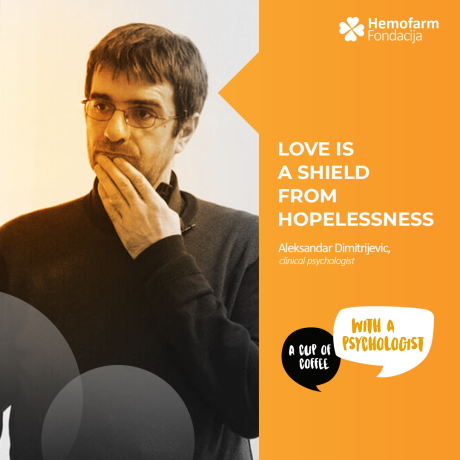
21/06/2021
Loss does not have to lead to despair and depression, love is a shield from hopelessness
Aleksandar Dimitrijević
clinical psychologist and psychoanalyst at the International Institute for Psychoanalysis in Berlin
Loss does not have to lead to despair and depression, love is a shield from hopelessness
One of the most unusual things related to the humankind is that everybody knows that losses are imminent, but almost nobody gets prepared for them. Is it even possible to prepare for the loss of a loved one? And how to fight hopelessness with love?
With the exception of religions, those big systems for providing general comfort and manipulating our feelings of anxiety, hope, and pain, we do not have the techniques for dealing with loss that we learn, transmit, master.… Moreover, talks about it are often interrupted, ’not to bode ill’ and it is easy to assume that no one even thought of introducing classes on this topic in colleges or schools. And how is it even possible to prepare for a loss?
Constant trepidation and thinking about that we could experience loss can lead to pessimism, dreariness and a sense of meaninglessness. And what’s more important, it would actually not help at all, since the pain due to a loss is imminent, and in case of sudden losses, it is very intense and long lasting. What one should do then?
Dark side of love
Let's start with the fact that the pain due to a loss has its meaning. It is the evolutionary companion of the bonding process and, in fact, represents the dark side of love. Because parenting has been so difficult in prehistory, and rejecting crying, helpless children great temptation, we are the descendants of those ancestors who loved their children, suffered when some of them died, and cared for the future children as best they could to avoid experiencing pain again.
Therefore, it is only natural that the loss hurts. Feeling of overwhelming sadness, shock and hopelessness, or contrary to that, complete lack of emotions accompany every great loss for some time. Everything is even more intense if we lose an extremely close person, if the loss is unexpected or if we are witnessing a mass tragedy. These feelings are then many times stronger.
The reservoir of sorrow is not inexhaustible
The grieving process however lasts for a certain period, it includes tumultuous psychological processes and then it starts to subside. Life is in the majority of cases stronger, and reservoirs of sorrow are not inexhaustible, so sometimes with the feeling of guilt, we still start to discover that it is possible to enjoy life again.
Two feelings play a decisive role in this process: the ability to love ourselves (again) and the ability to love others (again).
If I define myself and my value exclusively through the person who left me or convince ourselves, that no one else in the world is worth nearly as much as the one who left, the loss will lead to despair and depression.
However, if we do not neglect rich social life, if we maintain and build relations with many people that we can give love to and take love from, despair need not come. In such a situation is also only possible to preserve relations with the lost person and not forget who he/she actually was apart from his/her image in our head.
Creativity, activism, love protect from hopelessness
Even in the darkest moments, it is possible to remember that pain of loss has its bright side – love. Clear realization that we are capable of loving is more important than the fact that it hurts. Although pain may never completely fade, we can always give our contribution to the world through creativity, activism, new loves and optimism.

AUTHOR
Aleksandar Dimitrijević
clinical psychologist and psychoanalyst at the International Institute for Psychoanalysis in Berlin